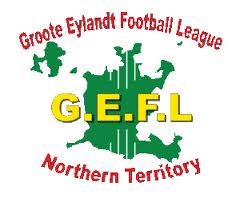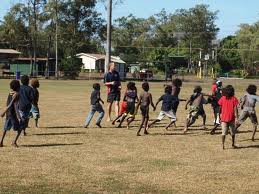Groote Eylandt Football – Brave New Worlds
- Thursday, February 28 2013 @ 05:16 am ACDT
- Contributed by: Wesley Hull
- Views: 5,225


“I took three boys into Darwin to play representative footy in November 2012 and we went food shopping together. I asked one of the boys to go and get me a few things from the shopping list and they had never heard of it before."
"When I asked what they eat for breakfast, the reply was ‘left over turtle or dugong’. Unfortunately we were unable to find that in Coles. It is great to see that the traditional food gathering still takes place in these areas such as fishing and hunting. If we can help them [indigenous people from Groote Eylandt] understand our culture then we will be able to achieve so many more goals.”
This recollection from Shawn Ford, the AFL Regional Development Manager for Groote Eylandt, says a great deal about the differences that still exist in many ways of life in remote parts of Australia. Aspects of life that many take for granted can be viewed differently by others.
Looked at through another lens, “more effort needs to be made by Westerners to try and understand the culture and rules that the locals live by. It is very hard to achieve the results you want to when you do not know what they are facing on a daily basis."
"Things that are not even thought about by everyday people going about their business in the city such as shaking hands is something that remote indigenous people rarely do. Communication is completely different and eye contact is often seen as disrespectful."
"Remote Australia is a rugged place to live but when you get to know the people and the culture, it is one of the most rewarding places to work in the country."
These two points of view sum up a world where two ways of life are slowly becoming one. Two brave new worlds that are taking the steps to learn from each other and broaden understanding, tolerance and cooperation.
This snapshot is of Groote Eylandt, the largest island in the Gulf of Carpentaria, a large body of water in Australia’s north that lies between the Arnhem Land coast and the Cape York Peninsula. The island is about 50 kilometres off the Northern Territory coast. It was named by the Dutch explorer, Abel Tasman, and the name Groote Eylandt is actually the old world Dutch term for "large island." It is a place which boasts a rich indigenous culture, magnificent protected environmental habitats, mining wealth for the inhabitants and beautiful natural scenery.
It also has Australian Rules football.
As Shawn states, “the Groote Eylandt AFL project was first established in 2009 [a joint project involving AFLNT, the Anindilyakwa Land Council and FaHCSIA], in response to a range of locally identified needs, creating football programs was seen as an integral part of improving community health and safety."
"The project is now in its fifth year with a strong focus on employment, leadership and educational outcomes. Companies such as BHP Billiton have now joined forces and are working collaboratively with the AFL on Groote Eylandt to start achieving goals such as employment amongst the local people."
BHP Billiton owns the manganese mine on the island, which contains around 10% of the world’s manganese deposits. For many years the island did not actively encourage tourism, but with the mine only having about 17 years worth of life remaining, the island is embracing tourism and other means of income.
This will have an impact on all facets of island life, and football will also ebb and flow with the economy of the island.
In a complex arrangement, Shawn points out that "[Australian Rules] football is a very popular game on Groote Eylandt, however there are a number of scenarios where teams will not show up for games, training [or other associated events]."
"Families receive royalties from the mine on a number of occasions each year which impacts the football competition. Players will fly into Darwin to purchase household items [or other needs]. Family ceremonies, such as a death, are another challenge facing all remote communities and is obviously unpredictable."
"Some weeks you may have enough people to field 8 teams and other weeks you may only have enough people for two teams. The miners have their own team and the locals really enjoy playing against them. It also creates a bond between the players from each team and provides a social opportunity for cross cultural education. Transport can be a factor on participation."

But a combination of school football and local competition is having a positive impact on the people of the Groote Eylandt communities. Shawn sees school participation as a starting point to get involved in the game but also in other aspects of day to day life.
“Junior football is seen as a vehicle to improve school attendance and reward the children who attend. There is a 'No School No Play' policy in effect and weekly interschool games are played between Umbakumba and Angurugu schools. Girl’s football has been introduced starting with the design of their own school Guernseys to play interschool football as the boys do."
Overall, Shawn sees the future of Australian Rules football on the island in a positive light. “With all key stakeholders working collaboratively to achieve common goals on Groote Eylandt, I believe the future looks very bright. I would expect the unemployment levels to decrease, school attendance to increase."
"The AFL is focused on achieving these goals and producing leaders amongst the community so the AFL program can be fully self sufficient in future years. The competition has room for growth and it would be excellent to see more talented players provided with an opportunity to play the game at the highest levels."
"[So far] Two players have played for the Gold Coast and Greater Western Sydney reserves teams and a few have played for the Northern Territory Thunder. Ultimately we would like to have someone drafted by an AFL club in the future and with the structures we currently have in place, I think it is achievable.”
It appears that the people of Groote Eylandt have been keen to embrace the game of Australian Rules football. It is also clear that the people of the communities on the island have lived with a combination of great tradition and great change. The melding together of the two worlds will set up the people and the game of Aussie Rules for a long and hopefully highly productive future.


 RSS news
RSS news Twitter
Twitter Facebook
Facebook